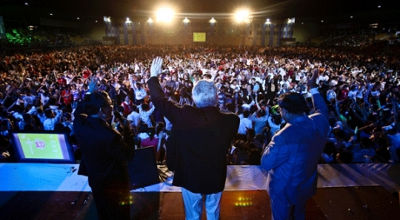Vietnam’s ‘Decree on Religion’ Clamps Down on Christianity
On Jan. 1, Vietnam updated its rules for enforcing its highest law regarding religion. Known as the Decree on Religion 92/2012 ND-CP, or simply ND-92, the new decree is meant to clarify rules written in 2005.
On close inspection, ND-92 does appear to clarify one thing: Vietnam’s intent to control the spread of religion, especially Christianity.
That’s according to a veteran missionary to Vietnam and acknowledged authority on Vietnamese Protestant Christianity. He has served as an advocate for persecuted Christians in Vietnam since it was reunited under communism in 1975. World Watch Monitor asked him to take a close look at the new religion decree. Because he travels extensively throughout Vietnam, we are not publishing his name. Here are his findings.
Background
Eight years ago, the highest levels of the Communist Party and the Vietnam government signaled they were shifting away from direct ideological opposition to, and repression of, religion, especially Christianity. They took up a new, managerial approach to religion, using registration as the chief means of control. This was somehow supposed to translate into more freedom.
The evidence for this change was the adoption of three new religion “laws:” The 2004 Ordinance on Religion and Belief; the 2005 Decree on Religion 22/2005/ND-CP on how to implement the ordinance; and the Prime Minister’s Special Instruction No. 1 Regarding Protestantism. The latter was hastily created to fill a hole during the run-up to Vietnam’s attempt to accede to the World Trade Organization at a time Vietnam faced harsh international criticism for it repressive religion policies and practices. It was intended to show quick progress in church registration while the larger laws were being worked out.
In the eight years since this legislation, the church-registration regime has been found seriously wanting. While eight Protestant denominations could prove they had been around since before the 1975 communist victory, more than half of Vietnam’s Protestants remain unregistered. Hundreds of applications by congregations to receive supposedly straightforward permission to function have been ignored or rejected by local authorities. For the dozens of house-church denominations that began to emerge in 1988, there is no clear path toward registration, despite what the laws may say. In actual practice, registration has often been used as a tool to manipulate churches, leading many to lose interest in getting it.
The new Decree on Religion 92/2012 ND-CP, or ND-92, which had long been rumored, is intended to replace and clarify its often murky predecessor, ND-22, as the operational guide for the implementation of the 2004 ordinance, Vietnam’s highest “law” on religion. The new decree went into effect Jan. 1.
A transparent registration regime is far short of full religious freedom. In theory, however, it could be better than the previous heavy-handed oppression and persecution sponsored from the top. Yet registration has been implemented inconsistently, leaving more than half of Protestants still unregistered and vulnerable to arbitrary harassment and oppression.
There is reason to believe this is intentional: Vietnam’s religion bureaucracy last February credited The PM’s Special Instruction on Protestantism for slowing the rapid growth of Protestantism. This application of the instruction is directly opposite to its originally announced purpose.
On the matter of registration Decree ND-22 left many things unclear, creating room for officials to apply much subjective discretion. Most often they simply ignored registration requests, or capriciously denied them. In practice, many religious communities functioned without too much difficulty.
The vagueness of Decree ND 22, however, also meant it was difficult to enforce some provisions of the ordinance. After gradually granting legal status during the last eight years to eight Protestant denominations, the registration process for Protestants effectively ground to a halt. Enforcement of other provisions of the religion laws has been arbitrary. From the government’s point of view, more clarity was needed if the ordinance and its operational decree were to become effective tools for managing religion. The result was ND-92.
The omens, however, were not good. During the drafting stages of ND-92, there were news reports of government consultation with religious leaders known to be sympathetic to the government. Even these leaders were said to object strongly.
















































